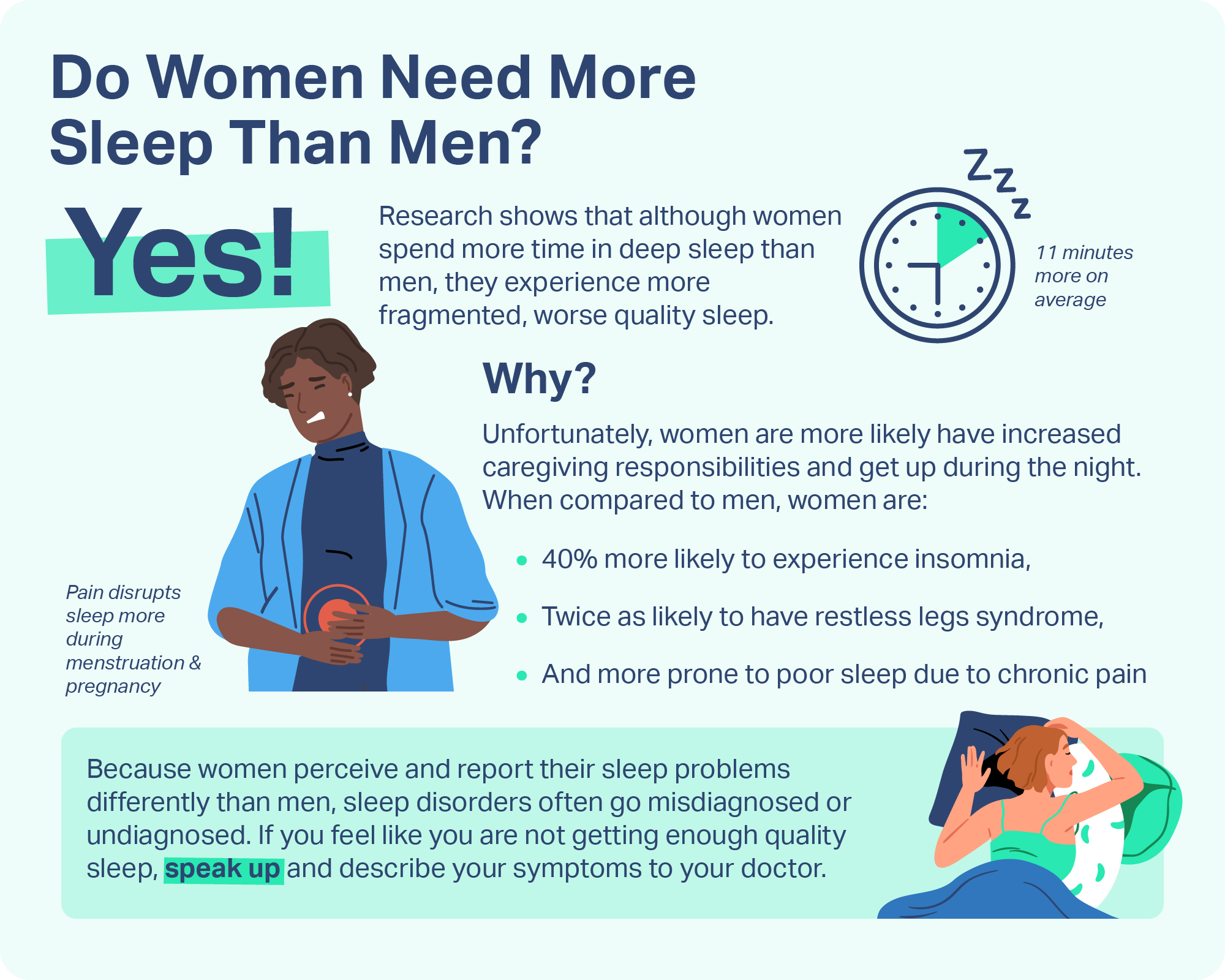Balancing the demands of today’s world often leaves little room for a peaceful night’s sleep. From hormonal fluctuations affecting sleep patterns to the increased prevalence of certain sleep disorders, women’s relationship with sleep is complex and multifaceted. These gender-specific sleep issues not only affect daily functioning, but can also have long-term implications for physical health, mental well-being, and even skin vitality.

As a result, the market for sleep solutions tailored specifically toward women is experiencing unprecedented growth, with experts projecting a substantial increase in demand over the coming years. This surge reflects a broader shift in health consciousness, where women are actively seeking effective, natural ways to improve their sleep and enhance their overall quality of life.

Sleep Issues for Women
Women often face unique sleep challenges due to hormonal changes and life stages, which can significantly impact their sleep quality. Here are some common sleep issues experienced by women:
- Insomnia: Women are more prone to insomnia, often due to hormonal fluctuations, stress, and anxiety. This can lead to difficulty falling or staying asleep, resulting in daytime fatigue and impacted functioning.
- Restless Legs Syndrome (RLS): This condition causes an uncontrollable urge to move the legs, often disrupting sleep. It is more common in women, particularly during pregnancy.
- Sleep Apnea: Although often underdiagnosed in women, sleep apnea can cause frequent awakenings and is associated with increased risks of cardiovascular issues.
- Physical Discomfort: Conditions like migraines, arthritis, and fibromyalgia, which are more common in women, can make it difficult to achieve restful sleep.
- Pregnancy and Night Sweats: Hormonal changes during pregnancy can lead to sleep disturbances, including night sweats, which affect over a third of pregnant women. These symptoms can persist postpartum as the body adjusts hormonally.
- Menopause: Hot flashes and night sweats during menopause can disrupt sleep, affecting up to 85% of women during this transition.
These sleep issues can significantly impact quality of life, leading to fatigue, mood disturbances, and decreased productivity.

The Importance of “Beauty Sleep” for Women
Quality sleep is often referred to as “beauty sleep” for a reason. It plays a crucial role in maintaining skin health and appearance. Research has shown that lack of deep sleep can accelerate collagen breakdown and negatively impact skin integrity, leading to various skin issues.
- Collagen Production: Sleep deprivation can hinder collagen production, which is essential for maintaining the skin’s barrier function. This can result in a compromised skin barrier, making the skin more vulnerable to environmental damage and inflammation.
- Circadian Rhythms and Skin Health: Disrupted circadian rhythms can impair the skin’s ability to synthesize collagen, increasing susceptibility to environmental stressors and inflammation. This disruption can lead to premature aging and other skin concerns.
- Skin Barrier and Hydration: Sleep deprivation can weaken the skin’s barrier function, leading to increased water loss and decreased hydration. This can result in dry, dull, and dehydrated skin, making it more prone to conditions like eczema and rosacea.
- Cortisol Levels and Inflammation: Inadequate sleep can elevate cortisol levels, triggering inflammation and breaking down proteins that maintain smooth and glowing skin. This can lead to skin issues such as acne and allergic reactions.
In essence, quality sleep is not just about feeling rested—it’s a crucial factor in maintaining skin health, supporting the body’s natural regeneration processes, and promoting overall wellness and vitality. This makes it particularly important for women to prioritize good sleep habits.

Strategies for Women to Improve Sleep
Women often face unique challenges when it comes to achieving restful sleep, influenced by hormonal changes, stress, and lifestyle demands. To combat these issues, many women are adopting various strategies to enhance their sleep quality and duration.
- Sleep Hygiene Practices: Establishing a consistent sleep routine is crucial. This includes going to bed and waking up at the same time every day, even on weekends. Creating a calming bedtime ritual, such as taking a warm bath or reading a book, can signal to the body that it’s time to wind down.
- Dietary Adjustments: Avoiding caffeine and heavy meals close to bedtime can help prevent sleep disruptions. Instead, some women opt for herbal teas like chamomile or valerian root, which are known for their calming properties.
- Limiting Screen Time: Exposure to blue light from phones, computers, and televisions can interfere with the body’s natural sleep-wake cycle. Many women are choosing to limit screen time at least an hour before bed to promote better sleep.
- Creating a Sleep-Conducive Environment: Ensuring the bedroom is dark, quiet, and cool can enhance sleep quality. Some women use blackout curtains, earplugs, or white noise machines to create an optimal sleep environment.
Despite these efforts, many women find that these lifestyle changes alone are insufficient to address their sleep issues. As a result, they are increasingly turning to sleep supplements as a potential solution to improve sleep quality and duration. This growing interest in supplements reflects the ongoing search for effective and safe options to address sleep challenges.

The Role of Supplements in Women’s Sleep Health
According to a report from Future Market Insights, consumers are increasingly seeking natural sleep aids due to rising stress levels and disrupted sleep patterns. The market for sleep supplements is expanding, with a projected compound annual growth rate (CAGR) of 5.2% from 2024 to 2034.
This demand for sleep supplements is driven by the need for safe and effective options that can address the unique sleep challenges facing women. According to a report from the CDC, about 5% of adult women use supplemental sleep aids, compared to 3.1% of men. While melatonin has long been a popular choice for sleep support, its use among women comes with specific considerations. Additionally, the market has seen a surge in alternative supplements aimed at improving sleep quality.
Limitations of Melatonin for Women’s Sleep Health
Melatonin is a widely used sleep aid that can be beneficial for many, but it may not be the best choice for everyone, particularly for women due to several factors:
- Hormonal Interactions: Melatonin can influence reproductive hormones, which can affect menstrual cycles and menopausal symptoms.
- Pregnancy Considerations: The safety and efficacy of melatonin supplementation during pregnancy remain unclear, warranting cautious use.
- Interaction with Other Medications: Melatonin can interact with various medications commonly used by women, including birth control pills, where additional supplementation could potentially lead to excessive melatonin in the system.
Given these potential interactions and considerations, women should discuss the use of melatonin with their healthcare providers to ensure it’s an appropriate choice for their individual circumstances.
Current Alternatives: The Search for Better Sleep Solutions
Consumers are increasingly seeking natural and non-hormonal alternatives to traditional sleep aids, driven by concerns over side effects and the desire for holistic health solutions. While there are several popular alternatives to melatonin, each comes with its own set of limitations
- Magnesium: Known for its calming effects on the nervous system, magnesium can help improve sleep quality. However, it may cause digestive issues like diarrhea if taken in high doses.
- L-Theanine: An amino acid found in tea leaves, L-theanine promotes relaxation and reduces anxiety without causing drowsiness. It’s generally well-tolerated, but some people may experience mild side effects like headaches or dizziness.
- Glycine: This amino acid can improve sleep quality by lowering body temperature and promoting relaxation. While generally safe, high doses may cause digestive upset.
- Valerian Root: Often used for its sedative effects, valerian root can help reduce the time it takes to fall asleep. However, it may cause mild side effects such as headaches, dizziness, or stomach upset.
- Chamomile: Popular in tea form, chamomile is known for its calming effects. It’s generally safe, but individuals with allergies to ragweed or similar plants should use it cautiously.
While these alternatives offer potential benefits, they often fall short of providing a comprehensive solution to women’s complex sleep needs. Inconsistent results or undesirable side effects highlight the ongoing challenge in finding an ideal sleep aid that not only addresses women’s sleep challenges, but also aligns with their preference for natural, side-effect-free alternatives.

Redefining Rest: How Maizinol® Innovates Sleep Solutions for Women
The growing awareness of sleep issues among women underscores the need for innovative approaches in sleep support—solutions that can offer more reliable, gentle, and tailored support for women’s unique sleep health needs. The ideal product would combine the efficacy of traditional sleep aids with the safety profile and holistic benefits that today’s health-conscious women demand.
Enter Maizinol®, a botanical, innovative ingredient designed to address the complex sleep needs of women:
- Natural and Safe: Derived from corn leaves, Maizinol® is non-GMO and hormone-free, aligning with the growing demand for natural sleep solutions.
- Hormone-Friendly: Unlike melatonin, Maizinol® works by stimulating the body’s own melatonin production, potentially avoiding the hormonal interactions that can be problematic for women.
- Clinically Proven Efficacy: In clinical studies, Maizinol® has demonstrated significant improvements in sleep quality, including a 30-minute increase in deep sleep (restorative rest), and up to a 49% improvement in overall sleep quality, potentially benefiting various aspects of women’s health, such as mood regulation and skin health. Maizinol’s latest study demonstrated significant improvements in women’s sleep quality, including faster sleep onset, fewer nighttime awakenings, increased total sleep time, and enhanced sleep efficiency and structure, all without altering circadian rhythms.
- Gentle Yet Effective: By binding to melatonin receptors and encouraging natural melatonin production, Maizinol® offers a subtle approach that may be particularly suitable for women sensitive to traditional sleep aids.
Maizinol®, a natural, hormone-free sleep aid, offers a promising alternative that is beneficial for women during different life stages where hormonal balance is crucial. As the market for sleep solutions grows, ingredients like Maizinol® that provide effective and safe options for women are likely to gain traction, addressing a critical need in the sleep health landscape.
New Clinical Study Results for Maizinol®
Great news for natural sleep solutions! Unigen’s recent clinical trial on Maizinol® showed significant improvements in sleep quality for participants struggling to fall or stay asleep. The study revealed up to a 49% enhancement in overall sleep quality, with benefits including faster sleep onset, fewer nighttime awakenings, and increased REM and NREM sleep. Using advanced actigraphy and EEG devices, this research highlights Maizinol® as a promising natural alternative for better sleep without the side effects of traditional aids. This groundbreaking study sets a new benchmark for evaluating sleep supplements in the industry! ➤ Read more about the new study results



